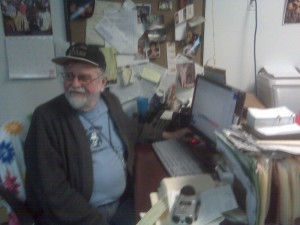LISTEN TO CHARLIE ERICKSEN
Audio clip: Adobe Flash Player (version 9 or above) is required to play this audio clip. Download the latest version here. You also need to have JavaScript enabled in your browser.
Not one Hispanic journalist was nationally syndicated when Charlie Ericksen started the Hispanic Link News Service. There have been improvements regarding Latinos’ (under)representation in the media, at least partly because of the exposure Hispanic Link’s syndicated columns have brought to Latino writers over the past three decades and 5,000 columns.
At Hispanic Link’s office in downtown D.C., Ericksen said, “[Hispanics continue to be] badly under-represented, particularly since there’s been a big cut-down on the number of newspapers that exist. There are just so very few around and those that are around, for the most part, are trained by journalism schools and by city editors and editors of papers to write White, [that is] to cover things where they don’t really give you the depth and understanding that you need to have of the various cultures that comprise our country.”
Ericksen formed relationships with newspapers across the country and sought out Latino columnists to syndicate nationwide. “We’d ask anybody [to write a column] who… had anything interesting to say, who had an experience which we felt was worth sharing. One of the things we tried to emphasize is not just doing what the Washington Post and so many other papers were doing and continue to do, which is just cover the negatives, the dropout story, the drug story, the stories that frame Hispanics in negative lights. We look for a lot of the positive stories, a lot of the people that they ought to be writing about in the mainstream, that they ought to be showing on TV and on the radio.”
Luis Carlos López is one of 300 “Linkies,” the title bestowed upon those trained by Hispanic Link. López said, “When I first met… Ericksen, it was sureal. A Nicaraguan immigrant who came to the U.S. at eight years old, I was overwhelmed with Washington, D.C. I had no idea I was on the eve of a memorable journalism career…. Before I could get comfortable, the 80-year-old Norwegian turned Chicano, made it a mission to let everyone who called the office know the particulars of the new Arizona intern. ‘He looks scared,’ he told callers through speakerphone, ‘Unfortunately his picture made him look better looking than he really is. He’s a huge disappointment… Can we send him back?'”
Being a Linkie almost got Peter Nares arrested. In 1983, the Link’s going rate for a piece was $25. Nares, who was reporting from Columbia, attempted to cash his check. Ericksen, who was in the habit of writing the subject of the reporting on the check, had written “Colombian cocaine.” In a letter to Ericksen, Nares wrote, “The bank took the view that I was a drug-smuggler and that the money was payment for drugs! Eventually I was able to convince them that the cheque was for a story on cocaine – not for cocaine itself, but they still said they were unable to accept it… Accordingly, I would be most grateful if you could cancel the cheque and in due course replace it with another. On the cheque, no words (such as “drugs,” guerillas, kidnapping etc) open to double-meaning should appear. If possible, the cheque should merely state “for Colombian news report” or words to that effect. I am sorry to bother you with this, but I have no wish to end up behind bars!”
How did it come to pass that a white guy from West L.A. would make it his life’s work to help bring Hispanic voices and issues into the American consciousness? “Because of my wife, who was born in Oaxaca, and who I met on the beach in Oaxaca and married on the beach without shoes,” Ericksen said. “When I brought her to the United States, I was working as a journalist [and] it became very clear to me… [that there was] discrimination against Hispanics… It became a very personal thing to me because of the way my wife was treated, the way our children were treated.”
Ericksen said, “We try to be objective… We trust the readers. We would like to give them both sides of any story. A lot of people say because of the culture that I have accepted as a Hispanic now that I’m not objective, but I think the people that aren’t objective are generally the white reporters who don’t know a darn thing about other cultures.”

